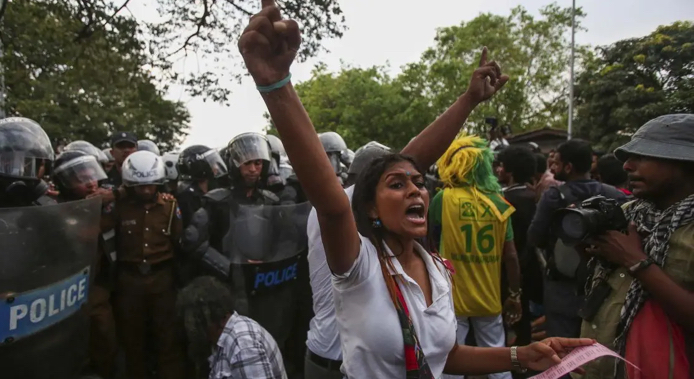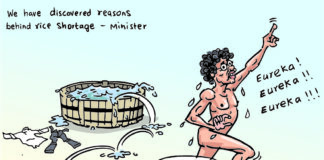More than 10 Sri Lankan civil society organizations have rejected the government’s proposal to establish the National Unity and Reconciliation Commission (NURC) on the lines of the South African Truth and Reconciliation Commission.
In a written submission to the Foreign Ministry at a consultation held recently, the civil society groups said: “While we do believe that truth seeking is an important part of addressing past violations and suffering endured by communities, especially in the areasof the country most affected by thewar, we are unable to support this proposed mechanism.”
The memorandum said that the victims of human rights violations have no confidence in any localcommission or tribunal created by theSri Lankan state.
“These commissions have in fact revealed the intentions of successive governments to scuttle truth-seekingand the victims’ quest foraccountability. Leading functionariesand politicians have time and again declared publicly that the government will not betray the war heroes and patriotic forces.”
“In 2015 the Government committeditself to establishing 4 transitionaljustice structures, including a judicialmechanism with a Special Counsel but more than 8 years later this has yet to be implemented. The failure to do so has denied victims theopportunity to seek justice through acredible mechanism as they have lostfaith in the domestic justice system. The lack of accountability for past crimes has deepened the culture of impunity.”
“The NURC is one among a series of commissions established by different governments over the last 30 years. Many of these structuresthat operated like some form of truthcommissions produced reports with abroad range of recommendations.Many of these recommendationsremain unimplemented. So what guarantees are there that the recommendations from the NURC will be implemented? In such a context is it fair to call on victims to appear before yet another commission, when victims risk being re-traumatised and face security threats for speaking out?” the civil society organizations asked.
“There have been talks about involvement of foreign experts in the NURC. In the past the Sri Lankan government called for foreignexpertise. For example, theInternational Independent Group ofEminent Persons, headed by India’s former chief justice P.N. Bhagwati and including the leading Japanese Professor Yozo Yokota. But the eminent-persons group quit in disappointment in March 2008, dueto government interference and the conflict of interest on the part of the Attorney General’s DepartmentCounsel who were in charge ofleading the evidence of witnessesbefore the commission.”
“When people appeared before the Consultation Task Force on Reconciliation Mechanisms in 2016 they spoke of their exhaustion of appearing before previous commissions and their loss of trust and confidence as they had appeared before so many commissions but with little changes on the ground,” the memorandum pointed out.
It further said: “Discovery of massgraves has become a dailyphenomenon in Sri Lanka howeverthe government has no intention to hold a credible investigation into the matter. Instead of assisting the process of investigation byappointing an expert team andsufficient funds to continue theprocess, the government officially have always obstructed the processes.”
The memorandum said that if thegovernment is really interested inwinning the public’s trust it shouldtake the following steps:
· Review the existing recommendations from previous commissions and develop a plan to implement them within a time frame.
· compile existing material and evidence presented to previous commissions and other state institutions to avoid victims having to repeat their testimonies again
· Create a climate for reconciliation including through the release of lands held by the military and ensuring equitable distribution thereof, withdrawal of oversized military deployed in the north and immediaterelease of prisoners accused under PTA who have either served their sentence or not been charged, stop the harassment of activists and victims, and ensure that minority land is not seized by state authorities and majority religious institutions.
· Review the NURClegislation, and incorporate therecommendations made beforethe Consultation Task Force.
· Take steps to expedite thecourt cases that are alreadydragged on for decades on disappearance and mass graves.
· Repeal the Prevention of Terrorism Act and have victim consultations on any draft laws especially laws that have largely framed minorities and dissenters as terrorists.”
In conclusion, the memorandum said: “If the Government goes ahead with the NURC without taking note of and co-opting these concerns, we will not be in a position to cooperate with the NURC process.”
“We also see this as an effort by the government to nullify the ongoingSri Lanka Accountability Project aspart of the UNHRC resolution 46/1. South Africa should not in any way initiate a process that will have a negative impact on a long-fought international accountability process by the victims. It is unfair on the victims to put them through another painful experience of truth-telling when there is no commitment from the government to actively listen to them, identify corrective steps and implement long overdue meaningful reforms.”
The civil society’s statement was endorsed by the following organizations:
Women’s Action Network (WAN)
CentreforHumanRightsDevelopment(CHRD) Mannar Women’s Development Federation Human Elevation Organisation
AmparaDistrictAllianceforLandRights Eastern Social Development Foundation Trincomalee District Women Network Institute of Social Development
LawandHumanRightsCentre(Jaffna) Affected Women’s Forum
MuslimWomenDevelopmentFederation Jaffna Civil Society for Equality
Samathai Feminist Friends Group -Batticaloa
PuttalamDistrictWomen’s SelfEmploymentandReconciliationForum Vallamai- Movement for Social Change.
END





